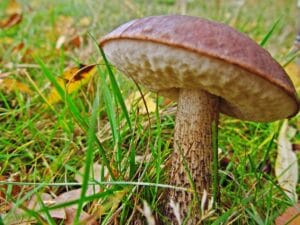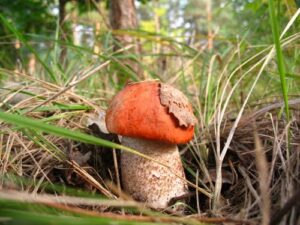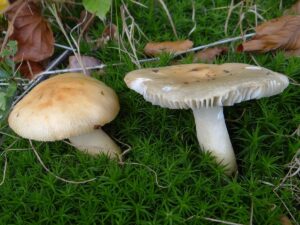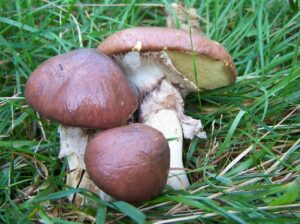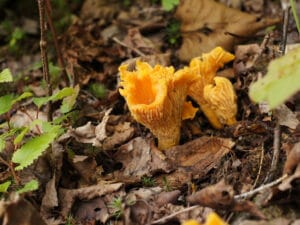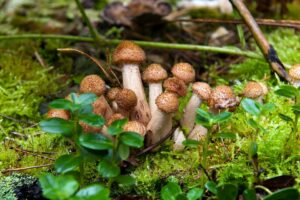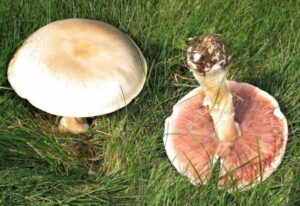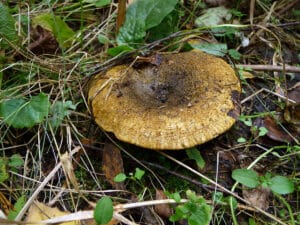Olga below discusses the deeply held national tradition of mushroom gathering. An important part of Russian food tradition for many centuries, Russian children are taught in school from an early age to tell the difference between various types of native mushrooms. Many, like Olga, will go with relatives and friends to the woods to put this knowledge to use. Let Olga introduce you to how to identify the start of the season, how to pick a good day to look for mushrooms, where to look for specific types of mushrooms, and just how popular this tradition remains today!
This resource is part of a series of free Russian lessons sponsored by SRAS called Olga’s Blog. The blog documents – in simplified, modern Russian – Olga’s experience finishing high school, starting college, and living life in Moscow in 2006-2007. The text, links, and format of this resource were last updated in 2023.
Briefly on Mushroom Season and Its Cultural Significance
It’s mushroom season not only in Russia. This tradition is also popular in Scandinavia, the Baltics, and elsewhere in Eastern and Central Europe. This landmass has in common dense, wet, forested land. Such land is often more difficult to use for intensive agriculture and in many of these places, the population has historically struggled to grow enough food to feed its population. Thus, the forest itself became and important food source – not only for meat, but also for herbs, berries, fruits, seeds, honey, and protein-rich mushrooms.
In most of these places, gathering all these wild foods is still popular – but mushroom picking holds a place of special importance. This may be because it sets these cultures apart from those elsewhere in western Europe. Ethnographers often refer to these cultures as “mycophillic,” as opposed to “mycophobic” cultures such as the English, where mushrooms are often seen as signs of death, rot, and even evil. In mycophobic cultures, mushrooms are often eaten, but only a comparatively limited range of them, and generally only those mushrooms specially raised under controlled conditions.
Mushrooms can often be poisonous and many grow specifically on dead trees, so the assumptions of mycophoboic cultures can be seen as erring on the side of caution. However, mycophillic traditions pride themselves on being able to tell the good from the bad – and being able to draw a valuable and delicious resource free from the forces of the earth using the power of their knowledge. For many of these cultures, being able to do this was often an important part of their survival.
Mushrooms also, of course, grow in western Europe and in many places across the US. One can find enthusiasts that hunt for these in those locations as well. However, if you do decide to head out looking for mushrooms, make sure that you go with an experienced mushroom hunter as one does need knowledge and experience to safely do so.
Mushroom Season in Russia: Simplified Russian Text from Olga’s Blog
This is Lesson 13 of Olga’s Blog, a series of intermediate Russian lessons.
Note that:
- All of the bold words and phrases have annotation below.
- Red words and phrases indicate the subject of this blog entry’s grammar lesson.
- *Asterisks indicate slang.
Дорогие друзья!
Поздним летом и осенью на подмосковных дорогах можно увидеть вереницы машин, стоящих на обочинах у края леса. Это приехали люди собирать грибы. Издревле (с древних времен) грибы были одним из промыслов русских людей. Сейчас поход за грибами – что-то вроде отдыха, развлечения, наподобие рыбалки или охоты. Это так и называют -«тихая охота».
Грибы растут в теплую и сырую погоду, когда дождливые дни чередуются с погожими (ясный, солнечный). В лес пора идти, когда на рынке начинают продавать первые грибы. Для сбора грибов нужна корзина, непромокаемая обувь и нож. Снарядившись таким образом, грибники идут в подмосковные леса. В ближнем Подмосковье в этот период грибников больше, чем грибов в лесу. Поэтому все едут как можно дальше – за пятьдесят, сто, и даже двести километров от Москвы.
Главным «трофеем», конечно же, является белый гриб. Это самый чистый, вкусный, ароматный и красивый гриб с белой толстой ножкой. Грибник всегда радуется такой находке, особенно если она первая. Во втором ряду по вкусовым качествам стоят подберезовики и подосиновики. Менее ценными являются сыроежки, маслята, лисички, говорушки. Сыроежки называются так потому, что их не нужно долго готовить. Маслята – за их маслянистую поверхность шляпки. Лисички – за их рыжий цвет, как у лисы. А говорушки (от слова говорить) содержат легкий галлюциноген, поэтому, попробовав их, люди видят яркие сны и при этом разговаривают. Поздней осенью, когда ночи становятся прохладными, растут белые и черные грузди. Они очень хороши для засолки.
Но самым распространенным грибом является опёнок. Опёнок – потому, что растет вокруг пней и на поваленных деревьях. Опят бывает так много, что на одном месте можно набрать целую корзину и полный рюкзак, а грибы еще остаются. Бывают случаи, что грибникам некуда больше собирать грибы. И тогда они снимают с себя рубашки, завязывают рукава, застегивают пуговицы и в образовавшийся мешок насыпают грибы.
Должна вас предупредить, что в подмосковных лесах много и ядовитых грибов, которые трудно отличить от съедобных. Поэтому, если вы соберетесь в лес за грибами, берите с собой опытного грибника.
Vocabulary and Cultural Annotations
Национальная страсть: National passion. Mushroom picking is a beloved, traditional pastime in Russia and many other country.
Вереница: Chain or row of similar objects, situated one after the other.
Обочина: Curb. The side or edge of a road.
Издревле: “from ancient times.”
Промысел: a trade or business. This word is also used to refer to anything activity that benefits the actor. There is a verb from this word as well, “Промышлять,” which means “to earn a living.”
Вроде: Like or “similar to.” The full phrase “что-то вроде отдыха” would translate to “something like relaxing.” A word that follows “вроде” takes the dative case.
Наподобие: Like or “similar to.” “Наподобие” is used less frequently than “вроде” and is slightly more literary. A word that follows “наподобие” takes the genitive case.
Погожий: Fine, favorable. This is word is used almost exclusively to refer to the weather.
Непромокаемая: waterproof. Note that this word is derived from “мокрый,” or “wet.”
Грибники: Mushroom-pickers.
Белый гриб: “White Mushroom.” Most often referred to in English by the Italian name, Porcini.
Подберезовик: Brown Cap or Brown Birch. Note that the name in Russian and English refers to the fact that the mushroom often grows on birch trees, which are common in Russia. Подосиновик: Orange Cap. This mushroom is often found on aspen trees, known as “осина” in Russian.
Сыроежка: Russule. Маслята: (sing. – масленок) “Slippery Jack” – the Russian is taken from the word “масло,” or “oil.” Лисички: (sing. – лисичка) Chanterelles.
Шляпка: a small hat. In reference to mushroom, this is the mushroom head. Note that in this word is in the diminutive of “шляпа” – the word most used to refer to hats that humans would wear.
Говорушки: Сlitocybe. These are poisonous if taken in large does.
Галлюциногены – одурманивающие наркотики – hallucinogenic drug.
Белые и черные грузди: Milk mushroom. The English name is taken from the milky fluid inside the mushroom.
Засолка: Pickling. Note the Russian word is derived from “соль” or “salt.” Salt is generally referred in Russia over vinegar for the pickling process.
Опята: (sing. – опенок) Honey Fungus.
Пень: Tree stump.
Поваленное дерево: Fallen tree.
Grammar Focus: Conjunctions
The conjunction is an auxiliary part of speech linking homogeneous parts within a simple sentence or simple sentences within a compound sentence.
– и –
Иван узнал, что гость и его тайная жена уже в первые дни своей связи пришли к заключению, что столкнула их на углу Тверской и переулка сама судьба и что они созданы друг для друга навек – (Bulgakov, The Master and Margarita).
Ivan learned that the guest and his secret wife knew from the first minutes of their affair that destiny itself brought them together on the corner of Tverskaya and the lane. They knew that they were created for each other for ever.
Coordinating conjunctions denote certain relations between clauses of equal status in a compound sentence, such as including, excluding and contradicting.
The conjunction и means either “too” or “also”, or “even”, as in “even more.”
Иногда, и довольно часто, я вставал рано. (Leo Tolstoy, Youth)
Sometimes, even quite often, I got up early.
– и . . . и; ни . . . ни –
The conjunction и may be also be doubled, (и . . . и), in order to express the sense of the English compound conjunction “both . . . and”. In this sense, “и . . . и” has an antonym: “ни. . . ни,” or “neither . . . nor.”
И денег сколько угодно, и погулять негде (Ilf & Petrov, The Twelve Chairs).
I have both enough money and nothing to spend it on.
Никто – ни фельдшер, ни Никита, ни сиделки не могли понять, зачем он ходил туда, зачем просиживал там по целым часам, о чем разговаривал и почему не прописывал рецептов. (Chekhov, Chamber Number Six)
Nobody – neither the medical attendant nor Nikita – could understand why he visited that place, spent hours there, what he was talking about there or why he did not prescribe medications (to the patients there).
Sometimes the construction “как…, так и…” is used to convey to meaning of “both… and…” as well.
– или –
The exclusive coordinating conjunction или “or” excludes one of the clauses it conjoins as a possibility.
Верь мне или не верь, это мне все едино! (Turgenev, Fathers and Sons)
Believe me or not, it’s all the same to me!
This conjunction may also be doubled, или . . . или, to mean “either . . . or”.
Или он, или я! Мы должны разлучиться. (Dostoevsky, The Settlement of Stepanchikogo and Its Inhabitants)
Either him or me! We should be separated.
– a; но –
Russian has two conjunctions corresponding roughly to the English conjunction “but:” “a” and “но.” The first of these, “a,“ is used when the subordinate clause contradicts the main clause.
За туманом горы. А им страшно. Там красиво. А им страшно. (Ekaterina Vanyukova, If)
Beyond the fog are hills. But they are afraid. It is beautiful there. But they are afraid.
“Но” is used to indicate that the second clause does not logically contradict the first.
Не знаю где, но не у нас. (Pushkin, I Don’t Know Where, but Not Here)
I don’t know where, but not here (with us).
More Free Russian Lessons From Olga’s Blog

The Language and History of Caviar: Olga’s Blog
Olga below describes the place of caviar in Russian food culture. In simplified Russian, she describes where the delicacy is harvested from, the major types of caviar, and how the types differ in cost and quality. We also provide an English primer below discussing more of the history of caviar, how it is eaten and […]
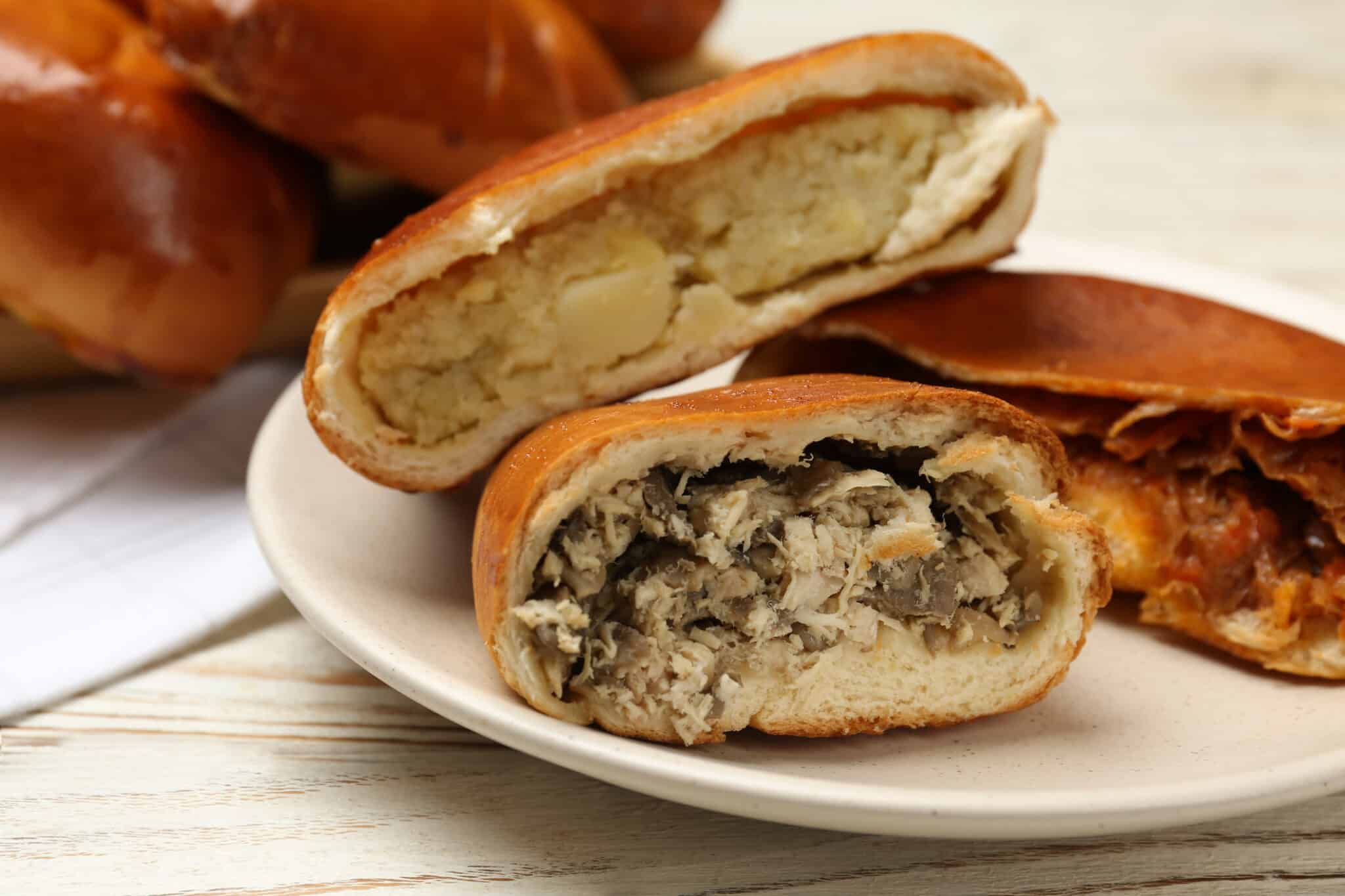
Mushrooms in Cultures and Cuisines: Olga’s Blog
Olga below continues her discussion of the deeply held place that mushrooms have in Russian culture. In part one of this discussion, she focused on how and where and find the mushrooms. In part two, below, she discusses how the mushrooms are preserved, prepared, and consumed. A staple of the regional diet for centuries, mushrooms […]
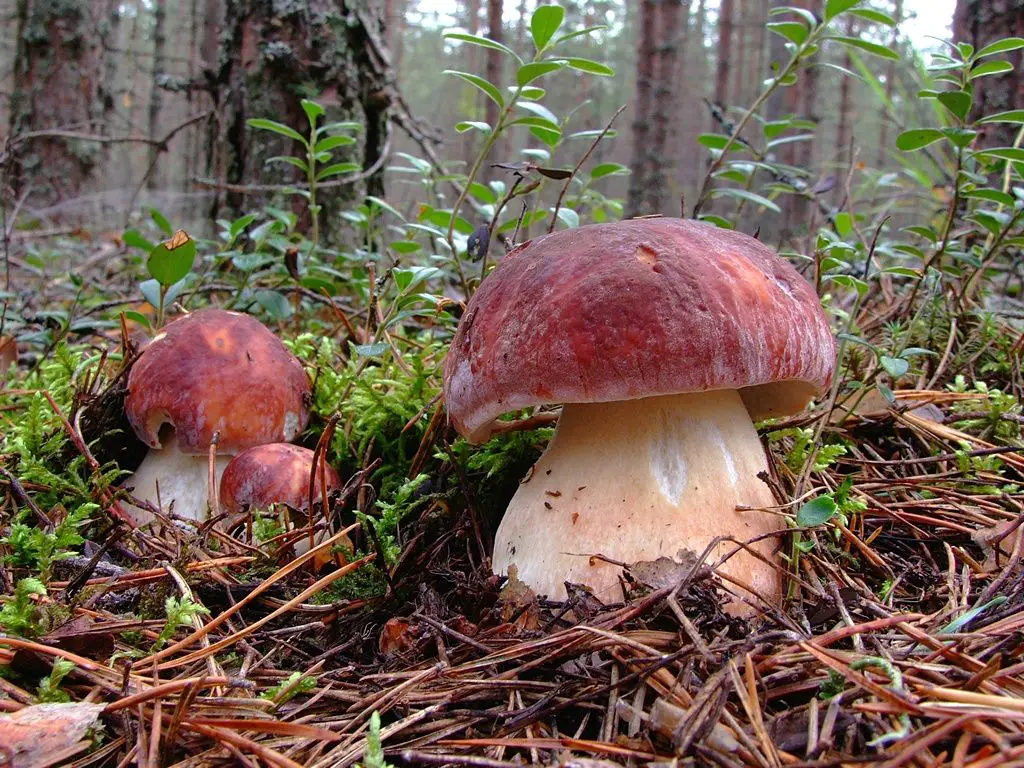
Mushroom Season Has Begun! Olga’s Blog
Olga below discusses the deeply held national tradition of mushroom gathering. An important part of Russian food tradition for many centuries, Russian children are taught in school from an early age to tell the difference between various types of native mushrooms. Many, like Olga, will go with relatives and friends to the woods to put […]

Study Abroad in America for Russians: Olga’s Blog
As part of her major program in international relations at Moscow State University, Olga applied to study abroad in the United States in 2007. As was not uncommon for students applying for study abroad in either direction, Olga hit several bureaucratic snags. What is perhaps most remarkable about the below text, however, is the description […]
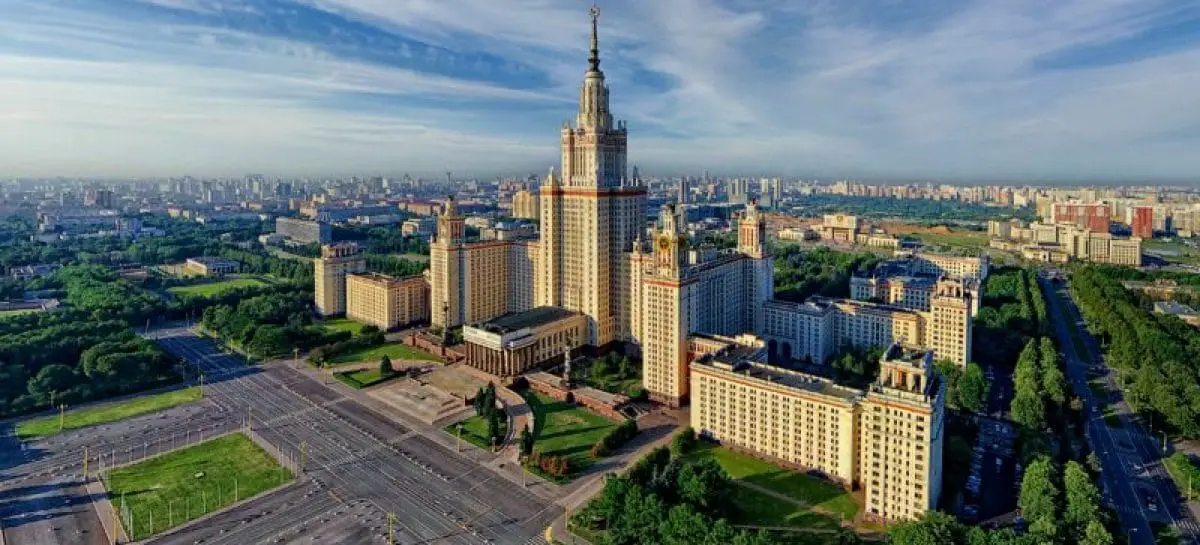
What is the First Day of University Like in Russia? Olga’s Blog
Below, Olga discusses what a first year freshman experiences on day one of their college education. The day offers no classes. It is instead filled with speeches, handshakes, and status symbols. All of this is highly indicative of the role of formality and ceremony in Russian education and Russian society. This resource is part of […]

